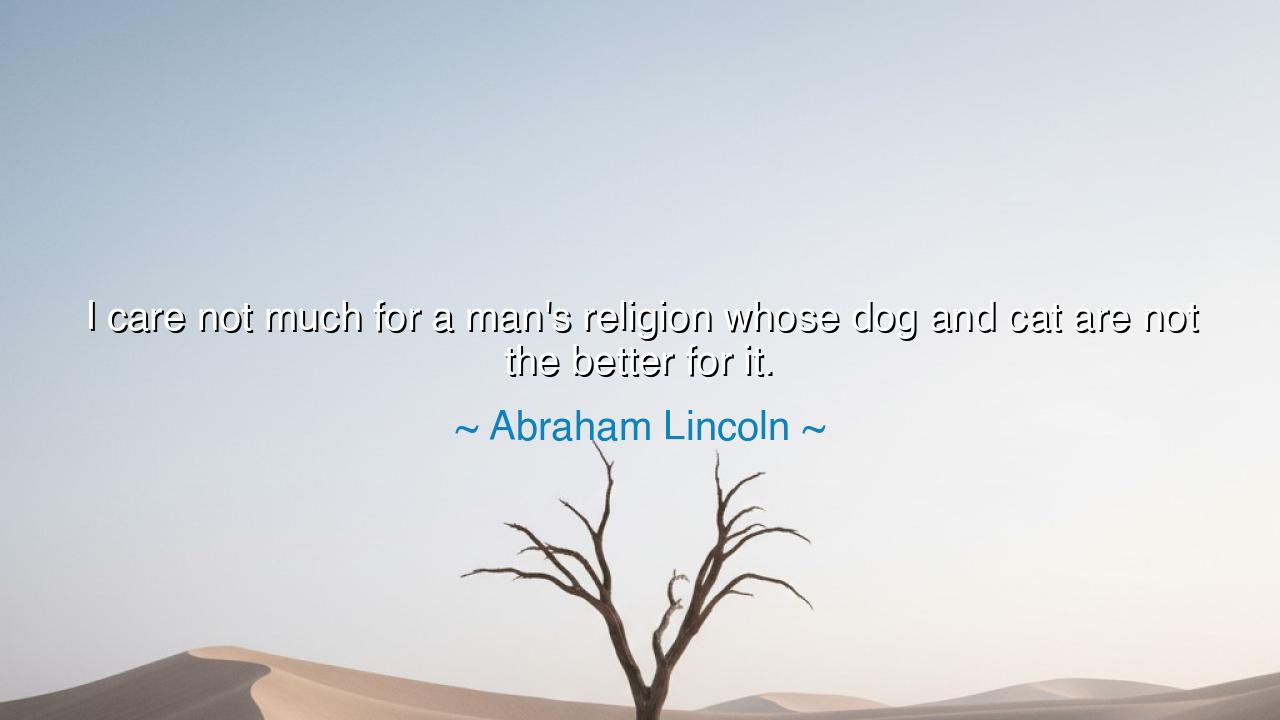
I care not much for a man's religion whose dog and cat are not






When Abraham Lincoln, the great emancipator and humble sage of the American spirit, said, “I care not much for a man's religion whose dog and cat are not the better for it,” he spoke with a wisdom that transcends creed and century. His words strike to the very heart of faith and morality — that true religion is not measured by prayer or proclamation, but by the gentleness of one’s actions, even toward the smallest and weakest of creatures. In this simple saying, Lincoln unveils a truth as eternal as it is tender: the worth of belief is proven not in temples or sermons, but in the quiet compassion of daily life.
Lincoln lived in an age torn by division and cruelty, where men prayed to the same God while fighting over slavery, each side claiming divine favor. He, who bore the weight of that nation’s conscience, knew how hollow words of faith could sound when they were not joined with mercy. To him, the truest test of religion was not in grand gestures of piety, but in how one treated those who could neither repay nor resist — the servant, the stranger, the animal that shares one’s hearth. A man’s faith, Lincoln reminds us, must radiate kindness so deeply that even his dog feels it in his hand, and even his cat senses it in his home.
The origin of Lincoln’s compassion may be traced to his youth on the frontier. He grew up among farmers and hunters, men hardened by survival. Yet he was known to stay a hand raised against a helpless creature, to rescue young birds fallen from their nests, to spare even insects when others would crush them. His heart, though weathered by loss and labor, was tender toward all living things. This was not weakness, but strength — the strength of empathy. It was this same spirit that later moved him to declare that all people, enslaved or free, bore the same divine spark. To respect life, Lincoln believed, was the first duty of the moral man.
History gives us another mirror for this truth in the life of Saint Francis of Assisi, who centuries earlier walked among men as a living sermon of compassion. He preached not only to kings and peasants, but to birds and beasts, seeing in each the handiwork of the Creator. His faith was not an argument, but a presence — and it softened hearts wherever he went. Lincoln’s words stand in the same lineage of wisdom: the idea that holiness is not found in separation from the world, but in reverence for all creation. For if one’s religion does not make even the humble animal feel safer, then it is not faith, but vanity dressed in sacred robes.
To live by this teaching requires not the chanting of creeds, but the cultivation of kindness — that quiet force which transforms cruelty into care, and indifference into love. In every act of gentleness, there is a reflection of divinity. To feed a hungry dog, to comfort a frightened child, to spare the life of a harmless creature — these are small gestures, yet they are the foundation upon which all higher virtues are built. The man who cannot be kind to the least of beings will not be kind to his fellow men. The compassion that begins at home is the seed from which justice grows in nations.
But Lincoln’s words carry also a warning — that religion without mercy is a shadow without substance. He had seen men who spoke of heaven while spreading misery on earth. He had witnessed preachers defend slavery, and politicians quote Scripture to justify greed. Such faith, he implies, is barren — for the divine cannot dwell in hearts closed to love. If one’s belief does not soften the soul, then it is no belief at all. The measure of a creed is not how loudly it is proclaimed, but how deeply it humanizes those who hold it.
So, let this be the lesson to all generations: live your faith in kindness. Let your religion — whatever its name — make your home a sanctuary of peace. Let it guide your hand to gentleness, your tongue to patience, your heart to understanding. Let even your dog and cat, your neighbors and strangers, feel its warmth. For the highest worship is not found in ritual, but in compassion; and the truest believer is not the one who kneels longest, but the one whose love extends farthest.
Thus spoke Abraham Lincoln, not as a theologian, but as a man who understood the sacred in the simple. His was a faith forged not in doctrine, but in mercy — a faith that freed not only the enslaved body, but the narrow spirit. And so his words endure as a commandment to us all: that the worth of any religion lies not in the heavens it promises, but in the kindness it brings to earth.






AAdministratorAdministrator
Welcome, honored guests. Please leave a comment, we will respond soon